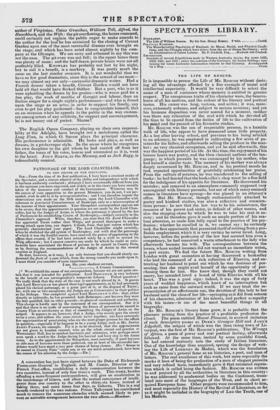PATRONAGE OF THE LORD CHANCELLOR.
TO THE EDITOR OF VIE SPECTATOR.
SIR—From the time of its first publication, I have been a constant reader of the Spectator, and a sincere admirer of the ability and independence with which it has been uniformly conducted ; although I have occasionally differed from you in the opinions you have expressed, and widely so in the views you have recently taken of the measures and conduct of the Government. Whatever may be the extent of your opposition to the present Ministers, you do not, I am per- suaded, wish to add to it by misrepresentation; and I can therefore impute the observations you made on the 16th instant, upon the Lord Chancellor with reference to provincial Commissioners of Bankrupt, only to a misconception of the manner of their appointment. Your Shropshire correspondent appears not to be aware, that the appointments in question are not made by the Lord Chan- cellor, but by the Judges of Assize, in whom the patronage is placed by the Act of Parliament fur establishing Courts of Bankruptcy,—subject certainly to the Chancellor's approval. When, therefore, you state that the Lord Chancellor has appointed Tories rather than Whigs, and proCeed thereupon to make a strong attack upon him, you depart, I think, from that just course which has generally characterized your paper. The Lord Chancellor might certainly, when he abolished the old system of Bankruptcy, and with that the patronage of which it was the fruitful source, have reserved the power of appointing to the offices then created, if he had been actuated solely by a wish to reward his Whig adherents ; but I cannot conceive any mode by which he could so satis- factorily have ascertained the fitness of persons to be named in County Fiats, as by desiring the recommendations of the Judges of Assize in the several counties in England. Be that, however, as it may, I am only desirous that you should clearly. un- derstand the facts of a case which, from the strong remarks you made upon it, I must think you consider of some importance. I am, Sir, your obedient servant,
, A County Commissioner.
(' We withhold the name of our correspondent, because we are not quite cer- tain that it was intended for publication. Lord BROUGHAM is very welcome to the benefit of our correspondent's temperate defence. Valeat quantum!
We really think that the state of the case is much altered by it. It proves
that Lord BROUGHAM has placed these legal appointments, as he had previously placed his clerical patronage, or a great part of it, at the disposal of Tories ; for, with one or two exceptions, the Judges are as Conservative in their politics as the Bishops. Our complaint against Lord BROUGHAM is this : that, either directly or indirectly, he has promoted Anti-Reformers--not because they were the best qualified, but on other grounds—to places of emolument and authority. This charge is hardly met by the statement of our correspondent. But it is said that there is no mode of ascertaining the fitness of persons to be named in County Fiats so satisfactory as that of consulting the Judges of Assize on the subject. It appears to us, however, that a Judge, who merely goes the circuit twice a year, and seldom the same circuit twice together, can have extremely few opportunities of ascertaining who are the most proper persons for the offices in question,—especially if he happens to be a young Judge, such as Mr. Justice JAMES PARKE, for example. For it is to be observed, that the appointments are not given to London counsel, who go the whole circuit and practise at Westminster Hall, but to resident barristers and atttornies, who perhaps never even speak a word to the Judge during his hurried and busy stay in the Assize town. As to the appointments for Shropshire, most assuredly, if good lawyers or able men of business were those preferred, one at least of the successful can- didates would have stood a very poor chance of being chosen. His " fitness to be named in County Fiats " could not, or we are much misinformed, have been the reason of his selection by the Judge.—En.]


















 Previous page
Previous page